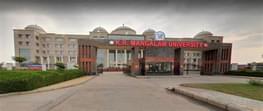Dr Mukesh Kumar received a Bachelor of Technology (B.TECH) degree from Kurukshetra University, Kurukshetra- Haryana (India) in 2001. He received a Master of Technology (M.TECH) degree from Guru Jambheshwar University of Science & Technology, Hisar - Haryana (India), in 2004. He received a Doctorate of Philosophy in Computer Science & Engineering (Ph. D-Computer Science Engineering) degree from Maharshi Dayanand University, Rohtak, Haryana (INDIA) in 2012. He has published more than 150 Research papers in various National Conferences, International Conferences, and various Peer-Reviewed and Referred Journals of National and International repute. He has reviewed more than 1000 Research Papers for publishing in various International Refereed Journals cum various National and International Conferences. He has chaired 3 International Conference as Session Chair cum Session Co-Chair. He has also acted as a Keynote Speaker at the National Conference. He has been invited as Resource Person cum Guest of Honor in 5 National Conferences/National Seminars. He has published 2 books titled "Mobile Computing (Information Technology (B.C.A- Maharshi Dayanand University, Rohtak, Haryana (INDIA).) He has supervised as a Guide to 35 M.Tech (Computer Engineering) students and 4 Ph.D (Computer Engineering) students.
Check Gurugram University

You have held key positions at education institutes throughout your professional career. What are the key factors that keep you connected with the education sector?
I can certainly provide information on the key factors that often keep individuals connected to the education sector. Many people working in education are motivated by the opportunity to make a positive impact on the lives of students. The ability to contribute to the personal and intellectual development of individuals is a powerful motivator. The education sector often encourages a culture of continuous learning.
This includes staying updated on new teaching methods, educational technologies, and subject matter knowledge. The constant pursuit of knowledge can be a fulfilling aspect for educators. Working in education provides individuals with a sense of purpose, knowing that they are helping to shape the future by equipping students with the skills and knowledge they need to succeed. Educators often develop strong relationships with their students. The opportunity to mentor, guide, and witness the growth of individuals over time can be a deeply rewarding aspect of working in education.
What is your philosophy of leadership? How would you describe your leadership style?
Leadership philosophy encompasses the fundamental beliefs and principles that guide a leader's actions and decisions. It can vary from person to person, but some common elements of effective leadership philosophy include servant leadership, this philosophy emphasizes that a leader's primary role is to serve and support their team members. It involves putting the needs of others first and helping them achieve their goals. Transformational Leadership inspires and motivates their teams to reach higher levels of performance and personal growth. They often lead by example and have a vision that inspires others.
Transactional Leadership focuses on the exchange of rewards and punishments in return for performance. They set clear expectations and use a system of rewards and consequences to motivate their teams. Collaborative leadership works closely with their teams to make decisions collectively. They value input from team members and seek consensus. In Autocratic leadership, the leader makes decisions unilaterally and expects strict compliance from their team members. Democratic Leadership involves their team in decision-making processes, seeking input and building consensus.
How does the curriculum of your institute ensure the best practice of industry?
I can provide general guidance on how educational institutions can ensure that their curriculum aligns with best practices in the industry. Educational institutions should collaborate with industry experts and professionals to gain insights into current industry practices, trends, and emerging technologies. This can be done through advisory boards, guest lectures, or partnerships with industry organizations. The curriculum should be regularly reviewed and updated to reflect the dynamic nature of the industry. This can be achieved through curriculum committees and ongoing feedback from students, faculty, and industry partners.
Practical, hands-on experience is invaluable. Incorporating real-world projects, internships, or co-op programs into the curriculum allows students to apply their learning in actual industry settings. The curriculum should be designed to be flexible and adaptable. It should allow for changes in response to industry developments, new technologies, and evolving best practices. Establish a system for gathering feedback from students, alumni, and industry partners on the effectiveness of the curriculum. Use this feedback to make improvements and adjustments. Consider international best practices if applicable, as some industries have global standards that should be integrated into the curriculum.
Check Gurugram University Scholarship
What do you think should be the University’s top priority over the next 10 years?
The top priority for a university over the next 10 years can vary depending on its specific mission, goals, and the changing landscape of education. Embracing technology and staying at the forefront of digital innovation is crucial. Universities should invest in online and blended learning, educational technology, and digital resources to improve accessibility, engagement, and the overall quality of preparing students for a globally interconnected world is essential. International collaborations, study abroad programs, and cultural exchange initiatives should be a focus. Universities should strengthen their ties with local communities, contributing to economic development, addressing community needs, and serving as valuable resources for the region.
What would you like people to know about your university they may not know?
Gurugram University is one of the newer universities in India, established to cater to the growing educational needs in the Gurugram region. It was founded to provide high-quality education in various disciplines. The university likely offers a range of undergraduate, postgraduate, and doctoral programs in various fields, including arts, sciences, commerce, management, and technology. The specific programs available may have expanded since my last update. Information about the university's campus, infrastructure, and facilities may not be widely known. Gurugram University may have invested in creating modern facilities for students, including well-equipped classrooms, libraries, and labs.
Universities often engage with their local communities through outreach programs, social initiatives, and partnerships with local organizations. People might not be aware of the specific ways in which Gurugram University is involved in its community. The university may have student clubs, societies, and extracurricular activities that contribute to a vibrant student life. This information can be valuable for prospective students and their parents. The university's accreditation status and rankings in national and international assessments can be important indicators of its quality and reputation.
What do you see as the University’s greatest strengths?
Some strengths of Gurugram University are the diversity and quality of academic programs offered by the university, especially in fields that are in high demand or unique to the region, which can be a significant strength. The expertise and qualifications of the faculty members who teach and conduct research at the university play a critical role in its strength. Strong accreditations and high rankings in national and international assessments can demonstrate the university's quality and reputation.
Comprehensive student support services, including career counseling, academic advising, and extracurricular activities, can enhance the overall student experience. A commitment to inclusivity, diversity, and equal opportunities for all students can be a notable strength. The achievements and contributions of alumni can be a testament to the quality of education and support provided by the university.


























![Kurukshetra University - [KUK]](https://image-static.collegedunia.com/public/college_data/images/appImage/1507809666kurukshetrauniversity1459276351.jpeg?h=111.44&w=263&mode=stretch)











![Indraprasth Institute of Aeronautics - [IIAG]](https://image-static.collegedunia.com/public/college_data/images/logos/1610370706iialogo11.jpg?h=72&w=72&mode=stretch)


.jpeg?h=72&w=72&mode=stretch)
.png?h=72&w=72&mode=stretch)
.jpeg?h=72&w=72&mode=stretch)
.png?h=72&w=72&mode=stretch)
 (1).png?h=72&w=72&mode=stretch)





![World College of Technology and Management - [WCTM]](https://image-static.collegedunia.com/public/college_data/images/logos/1742542448wctm130.png?h=72&w=72&mode=stretch)
![Dronacharya College of Engineering - [DCE]](https://image-static.collegedunia.com/public/college_data/images/logos/1630479236739.png?h=72&w=72&mode=stretch)

![Maharshi Dayanand University - [MDU]](https://image-static.collegedunia.com/public/college_data/images/logos/1463649087logo.jpg?h=72&w=72&mode=stretch)


![Guru Jambheshwar University of Science and Technology - [GJUS&T]](https://image-static.collegedunia.com/public/college_data/images/logos/1394876013Guru Jambheshwar University of Science and Technology.png?h=72&w=72&mode=stretch)
![DPG Degree College - [DPGDC]](https://image-static.collegedunia.com/public/college_data/images/logos/1748958943download10.jpeg?h=72&w=72&mode=stretch)
![Indira Gandhi University - [IGU]](https://image-static.collegedunia.com/public/college_data/images/logos/1498641491deepika.png?h=72&w=72&mode=stretch)


![BM Group of Institutions - [BMGI]](https://image-static.collegedunia.com/public/college_data/images/logos/1711250455download2.png?h=72&w=72&mode=stretch)

![Global Institute of Technology and Management - [GITM]](https://image-static.collegedunia.com/public/college_data/images/logos/1714371046logo2.jpg?h=72&w=72&mode=stretch)



Comments